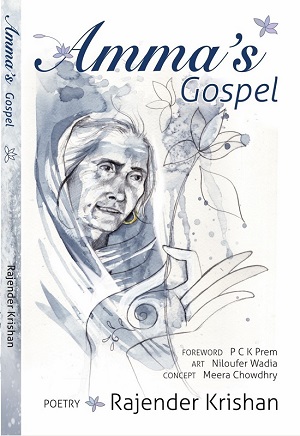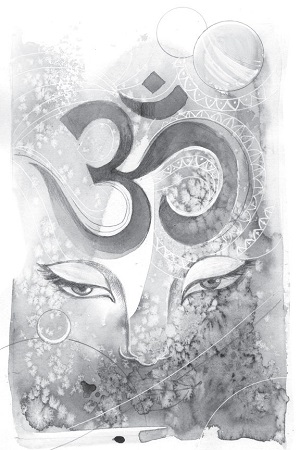Dec 28, 2025
Dec 28, 2025
Amma's Gospel by Rajender Krishan
Amazon ebook ASIN: B08LSYFLN4 Amazon USA | Amazon India
Paperback ISBN-13: 978-1-947403116 Amazon USA | Amazon India
 In a civilised modern society as ours, nuclear family is conspicuous today by a rapidly swelling number while, on the other hand, joint families — having faced a sharp decline and fall — are only a rare sight now. Along with it, story-telling by grand pa, grand ma or other senior members of a family is an event of the past. Which is why now a days story or gospel is mostly read, hardly told. Rajinder Krishan has made reading it easy through his lyrical presentation of the truth and substance of life succinctly embodied in Amma’s Gospel. Amma, implicitly an old mother, represents here a totality of knowledge, insightful observation, love for mankind and sorority to illumine inner man/woman. The word Gospel literally means the teaching of lord Christ; to be more specific, it refers to the record of Christ’s life and teaching in the first four books of the New Testament. But gospel truth is something which is regarded as absolutely true and Amma’s Gospel bears testimony to the same.
In a civilised modern society as ours, nuclear family is conspicuous today by a rapidly swelling number while, on the other hand, joint families — having faced a sharp decline and fall — are only a rare sight now. Along with it, story-telling by grand pa, grand ma or other senior members of a family is an event of the past. Which is why now a days story or gospel is mostly read, hardly told. Rajinder Krishan has made reading it easy through his lyrical presentation of the truth and substance of life succinctly embodied in Amma’s Gospel. Amma, implicitly an old mother, represents here a totality of knowledge, insightful observation, love for mankind and sorority to illumine inner man/woman. The word Gospel literally means the teaching of lord Christ; to be more specific, it refers to the record of Christ’s life and teaching in the first four books of the New Testament. But gospel truth is something which is regarded as absolutely true and Amma’s Gospel bears testimony to the same.
As I started going through Rajender Krishan’s Amma’s Gospel it came to my mind that the poet has envisioned Amma who, in reality, is his paternal grand ma, and in the words of P.C.K. Prem in his foreword to the book, “assumes the most benign figure of ‘mother of humankind’ one begins to realise and so the poet if immortalises ‘Amma’ it is for wellbeing of humanity”. The book, wrapping up some innate feelings and insightful observations, contains forty five poems — each of them befittingly adorned with meaningful illustration by Niloufer Wadia. It enhances the visual viability of the book.
 It begins with the poem Om — the ‘sound of silence’ and ‘timber of the Universe’ which, if pronounced properly, casts a positive impact on one’s mind and thought process. It is followed by Namaste — an utterance while addressing someone with folded hands in the purely Indian style. Apparently it is like that but viewed in depth, it signifies ‘Salutations to the One / that pervades the entire cosmos’ where ‘dwells the very Cause of Life’. While, on the one hand, it means the vibrant symphony ‘of love, light, truth, harmony’ in our hearts’ solitude, it justifies the verity of the sound of silence in “Om, the only verse/Manifesting eternally/The Universe’. And the person we learn this lesson from is undoubtedly Amma Ji. Yes, it is Ammaji who experienced colonial subjugation and suppression, also suffered the plight of becoming a refugee but faced the transition and trauma of partition boldly. Confidently she could assert, having faith in the Almighty, that “The one that is always with me/Have no doubt, that one knows”. It cast a lasting impact in the mind of the poet as a “Principle, that transforms even today/into a blessed and enthralling epoch/each time she walks down my memory lane”. In the poem Greetings, the same thought is reflected as in Namaste. And the thought is a Universal one.
It begins with the poem Om — the ‘sound of silence’ and ‘timber of the Universe’ which, if pronounced properly, casts a positive impact on one’s mind and thought process. It is followed by Namaste — an utterance while addressing someone with folded hands in the purely Indian style. Apparently it is like that but viewed in depth, it signifies ‘Salutations to the One / that pervades the entire cosmos’ where ‘dwells the very Cause of Life’. While, on the one hand, it means the vibrant symphony ‘of love, light, truth, harmony’ in our hearts’ solitude, it justifies the verity of the sound of silence in “Om, the only verse/Manifesting eternally/The Universe’. And the person we learn this lesson from is undoubtedly Amma Ji. Yes, it is Ammaji who experienced colonial subjugation and suppression, also suffered the plight of becoming a refugee but faced the transition and trauma of partition boldly. Confidently she could assert, having faith in the Almighty, that “The one that is always with me/Have no doubt, that one knows”. It cast a lasting impact in the mind of the poet as a “Principle, that transforms even today/into a blessed and enthralling epoch/each time she walks down my memory lane”. In the poem Greetings, the same thought is reflected as in Namaste. And the thought is a Universal one.
Now about the title poem — Amma’s Gospel. In the entire collection in general and in the title poem in particular, Amma plays an advisory role with her feminine wisdom endowed with pragmatism so that future progeny can live well with a positive approach to life. Divided into three parts, the first one begins with the ‘simple gospel’ — ‘love yourself/by being true to yourself /Be not in a haste to react/First anticipate then contemplate/and then respond/Follow the right path/Be happy/Be successful’. It has been used as a tag line between poems. The second part elaborates the first one — it urges not to participate in the ‘play of deception’ and ‘blame games’, while the third part repeats the first one as Amma’s response to the poet’s question “What is the way then, I would ask”? to shun or avoid “a fraudulent integrity/of tumbling self-esteem/unable to see its very own reflection”.
True to say, nature, divinity and womanhood are the areas mainly thrusted upon while Amma preaches us something — value-enriched as also sermonised. In the poem ‘Nature’ (P‑113) it is distinct that ‘An inherent marvel/of illusory chaos/is the logic of nature’ which is but ‘the circadian routine’ manifest in ‘Life of cyclic seasons in the pairs of opposites’ like love and hate, joy and sorrow and so on. Relationships being always of varied nature in human life, the poet seeks another dimension to express himself in a poem Like ‘Leaf’ in which nature is very much a part of human nature — “The Autumn saw/my green body turn yellow/and with the flow of winds/I moved on towards/my new journey”. The journey undoubtedly is of a human being, and the poet identifies his father’s role with that of a tree — “The tree, my father/having nurtured me/standing majestically/and silently/did not hold me anymore”. To come of age and dissolve one day into ‘The eternal embrace of Mother earth’ is the ultimate truth but the poet raises a veritable question : ‘Is this dissolution Death or Life’? And he asserts — it is ‘the path that we seek Nirvana’ (P. 135).
It is in the greater cycle of Nature that the poet finds out the inexorable Leela, the cycle of physical birth and death, the game plan of Prakriti and Purusha and science behind the three Gunas — Suttva, Rajas and Tamas. (P. 53-54). And needless to state, “The Leela will march on/with the vibrance and radiance/of its own glory” (P. 59). The term Leela has to be viewed in a broad sense since it includes His omnipotence and omnipresence; earnestly, the poet has paid his tribute to the Almighty in the poem Devotion — “The one beyond infinity/permeating the cosmos/is mystically invisible”. And that is what we experience in life which is “the only constant/that is forever changing” (P. 119).
Notably, preaching of Amma — having played a pivotal role in moulding Rajender Krishan’s poetic outpourings besides his own thoughts on life and divinity — commands influence over the concept of epistemology and womanhood which feature well in the entire collection to move a reader with some precious lessons from a modern lyceum. It was really interesting to go through the poem Esteem : in the poem, he felt intrigued at her silence as “he quizzed/She remained quiet/To her the respect for/The precepts of dignity/was far more important/than winning an argument”. In another poem Maturity, the poet focuses on a woman’s gracious expression which also reflects what remained unsaid but with no pretention. The poet’s regard for womanhood is indicative of a sense of submission to the ‘mother of humankind’ : That’s Ammaji.
There is a lot more. Poems like Healing, Connection, Maya, Destination, Shiva, Today, Gurdwara, Guilt provide insights into the reality of life when we need His divine blessing to illuminate our way to spiritual assent in this world stricken with turmoil, distrust and animosity. Amma’s Gospel is really refreshing, exemplary too as an eye-opener.
Works cited: Amma’s Gospel by Rajender Krishan, Setu Publications, USA, October 2020
11-Dec-2021
More by : Dr. Manas Bakshi